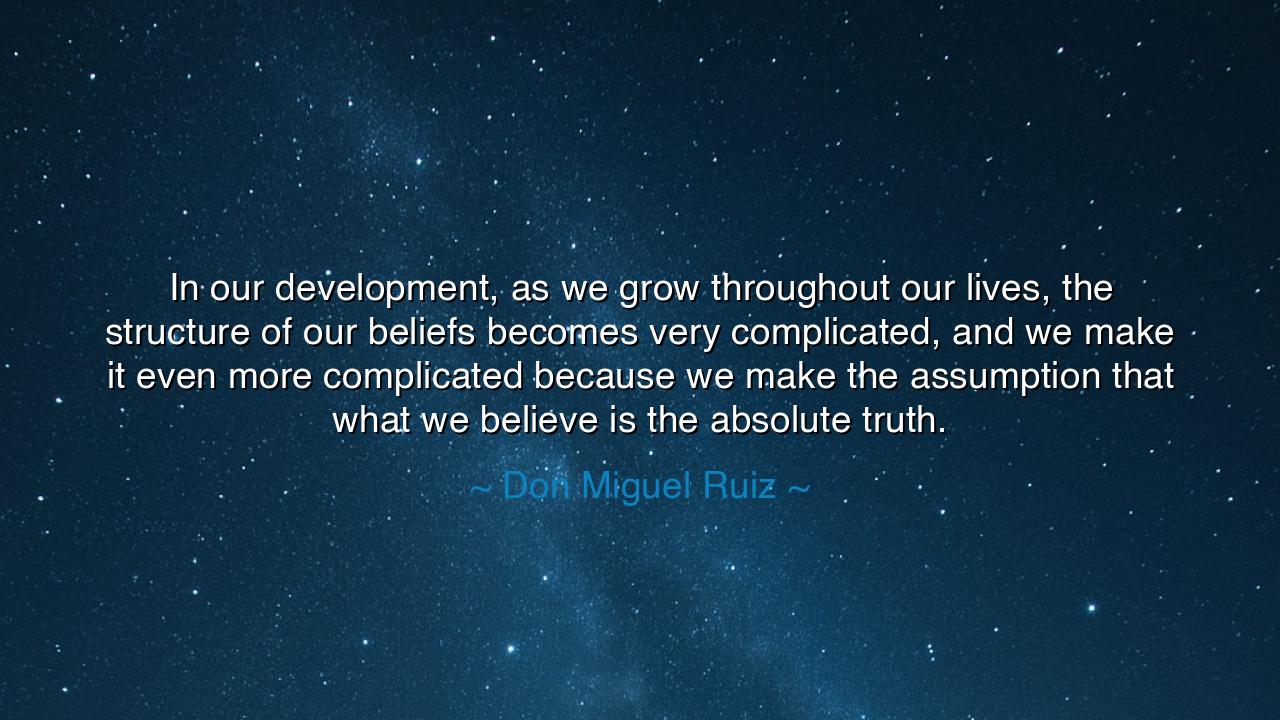
In our development, as we grow throughout our lives, the
In our development, as we grow throughout our lives, the structure of our beliefs becomes very complicated, and we make it even more complicated because we make the assumption that what we believe is the absolute truth.






Listen closely, O children of wisdom, for the words of Don Miguel Ruiz carry with them a profound truth about the nature of beliefs, their formation, and the complexities they bring to our lives. He said, "In our development, as we grow throughout our lives, the structure of our beliefs becomes very complicated, and we make it even more complicated because we make the assumption that what we believe is the absolute truth." These words speak to the foundation of our existence — to the very beliefs we hold dear, to the lenses through which we view the world. Ruiz reveals to us that as we grow, the beliefs we inherit, the ones we adopt, and the ones we create for ourselves, gradually form a complicated structure that governs our thoughts, our actions, and our understanding of reality.
What is belief, O seekers? Belief is the framework through which we interpret the world. It is not a simple truth, but a lens that colors everything we see. As we develop, from the early days of childhood to the later years of life, the beliefs we hold become more intricate, more entangled, and often, more difficult to discern. We learn from our families, our cultures, and our experiences, building a tapestry of thoughts and assumptions about what is true and what is not. But herein lies the danger: we often mistake our beliefs for the ultimate truth, thinking that what we believe is the absolute reality. The more complex our beliefs become, the more likely we are to cling to them as unchallengeable facts, never questioning their origins or their validity.
Consider, O children, the ancient philosophers who, in their quest for truth, recognized the importance of examining one's beliefs. Socrates famously declared that “the unexamined life is not worth living.” He understood that to truly understand life, we must first examine the beliefs we hold, for beliefs are the filters through which we make sense of our world. Socrates did not merely accept his own beliefs as truth; he constantly questioned, challenged, and sought deeper understanding. In this, he teaches us that to believe something without scrutiny is to live a life of illusion, trapped in the web of our own complexities.
In more recent history, Martin Luther King Jr. was a man who saw through the complexities of his time, recognizing that many of the beliefs upheld by society were built on falsehoods, injustice, and prejudice. His belief in equality, deeply rooted in his faith and moral understanding, led him to challenge the beliefs of his society, which saw some men as less than others. King's work was not just about altering laws, but about breaking down the complex structures of belief that kept people divided and trapped in their own assumptions. He called on humanity to examine their beliefs and to question whether they were truly rooted in justice and equality, or if they were merely perpetuating systems of inequality and oppression. His work was a call to examine the foundation of our beliefs, to strip away the complexities and confront the truth of who we are as a people.
In our own lives, O children, the lesson is just as clear: we must acknowledge the complexity of our beliefs, but we must also recognize their limitations. The structure of beliefs we create may serve us at certain points in our lives






THTu Thanh Ho
This quote really makes me think about how we develop our beliefs throughout life. It’s easy to fall into the trap of thinking that our beliefs are objectively true, but Ruiz points out that this can complicate things. If our beliefs become so complex, how do we untangle them? Shouldn’t we be more willing to recognize the fluid nature of truth and be open to reevaluating our beliefs as we grow and learn?
YNYen Nhi
Ruiz’s observation challenges the assumption that our beliefs are always grounded in truth. It’s fascinating how over time, we make our beliefs more complex, sometimes to the point where they are difficult to untangle. But is it possible that by doing so, we lose sight of what’s truly important or real? How can we stay grounded in the present moment and question what we’ve always believed without getting overwhelmed by the weight of all our accumulated assumptions?
NPNhi Pham
This quote seems to capture how we often cling to our beliefs as if they are irrefutable facts. But if the structure of our beliefs becomes increasingly complicated, does that mean we risk losing sight of the simplicity of truth? How do we balance having strong beliefs with being open-minded? Maybe the process of personal growth is about shedding some of those assumptions, embracing uncertainty, and realizing that truth is less fixed than we think.
ATHoang Anh Tho
I find Ruiz’s point intriguing. It’s easy to get caught in the trap of thinking our beliefs are the truth, especially when they’ve been shaped over a lifetime. But how can we break free from this illusion and embrace the idea that truth may not be absolute? Does this mean that personal growth requires questioning our deeply held beliefs? How can we reconcile our need for certainty with the openness to consider new perspectives?
HDPhuong Hanh Dan
Don Miguel Ruiz’s quote makes me reflect on how our beliefs evolve over time. As we experience life, our beliefs become more layered and complex, often leading us to assume that our perspective is the absolute truth. But is it possible that our beliefs are just one lens among many? How often do we challenge our own assumptions? Shouldn’t we strive for a more flexible view, acknowledging that truth can be subjective and constantly evolving?